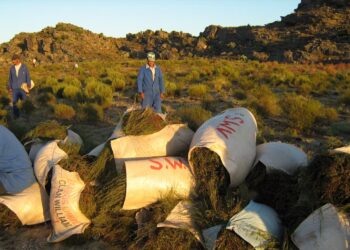Biological solutions, once considered supplementary, are now central to meeting market demands and ensuring sustainable production.
In a statement, InteliGro revealed that, with global markets, especially with the EU imposing stricter import inspections and residue limits, biological crop protection is no longer a complementary tool but a necessary pillar for maintaining market access and securing long-term sustainability.
“Biological crop protection has quickly moved from being a complementary option to becoming essential, as part of holistic programmes that integrate chemistry and biology. It enables growers to retain market access, protect their soil and ecosystems, and still deliver high-quality yields,” the statement said.
Martin Booyens, technical marketing specialist for biological solutions at InteliGro, with international experience in countries like Spain and Israel, described this as a “turning point”.
“Growers are facing increased phytosanitary pressure, especially from the EU, where new regulations and stricter import inspections have recently been implemented. At the same time, we’re losing access to chemical products at an alarming rate. Those who don’t start taking biology seriously will fall behind,” Booyens said.
Adopting biological technology
The statement highlighted that restrictions on chemical products include the CMR classification (carcinogenic, mutagenic, or reproductive toxins), along with strict regulations requiring only certified PCOs to handle certain substances at the farm level.
The “EU Green Deal” aims for a 50% reduction in pesticide use and a 20% decrease in fertiliser use by 2030. These targets are placing pressure on exporting countries like South Africa to adopt biological alternatives more swiftly.
Booyens pointed to three major forces driving this shift:
- Fewer chemical products are available due to international regulations.
- Residue limits in export markets – especially Europe – leave little room for traditional chemical programmes.
- Advances in technology now allow biological products to be just as effective as chemical solutions against certain pests.
Related stories
- Safe pesticide management: A guide for SA farmers
- Smarter water management key to successful farming
- When pests fight back: Pesticide resistance threatens crops
- Macadamia exports adapt to changing markets, US tariffs
“We’ve used natural enemies such as parasitic wasps and predatory mites for decades. The difference is that they used to be supplementary. Today, they form the backbone of integrated pest management (IPM), marking a shift away from over-reliance on chemistry, towards a balanced approach where biological solutions play a central role.
“International examples, such as Almería in Spain, show what’s possible. Once known for high residue levels, Almería is now a global leader in biological farming, with 40 000 hectares of crops under production,” he said.
He also stated that they are using the same technology in South Africa and have already made significant progress, exporting soft fruit, table grapes and citrus with zero pre-harvest residues to strict markets.
Crop and fruit success stories
Building on this momentum, local success stories are already emerging:
- Peppers and cucumbers: In controlled environments, near-complete biological control is possible.
- Citrus: Supported by Citrus Research International (CRI), South Africa is a leader in the field. Local growers employ biological strategies, such as using viruses to control bollworms, sterile insect technology for fruit flies, and bicarbonate for controlling black spot.
- Table grapes: Bacillus, bicarbonate, and Trichoderma are effectively managing powdery mildew and Botrytis. These products also play a key role in row crops.
“We’ve been struggling with a cultivar that’s been hit hard by botrytis for years. After incorporating biological products into our programme, we were very satisfied with the quality of the grapes we exported. The combination of chemistry and biology brought a noticeable improvement, ” said Jannie van Niekerk, a table grape producer from Trawal on the West Coast.
Morné Paxton, also a table grape producer in Trawal, agreed: “I feel that the biological products strengthen the overall programme and reduce the risk of residues. They also improve resistance management, thanks to a broader spectrum of available solutions.”
Shifting landscape: Opportunities and challenges
Booyens expects the industry to undergo a significant shift over the next five to ten years, driven by the rapid international growth of macrobiology, the breeding of beneficial insects, which is expanding at an annual rate of 17 to 25%.
“We’re seeing large multinationals acquiring smaller biological firms and fast-tracking advanced technology into South Africa. This means better product quality and faster access to new generations of biological solutions for our farmers.
“We’re used to rapid results from chemical products. Biology works more preventatively and takes longer to show impact, but the results are more sustainable and build healthier soils and ecosystems,” he said.
Booyens’ practical advice to farmers includes:
- Starting small and starting early: Trial it in a test block.
- Preparing your team: Good monitoring and equipment are essential.
- Sticking with it: The second season often shows the clearest results, with no yield losses.
READ NEXT: Grain farmers break records at prestigious Grow for Gold Awards

















